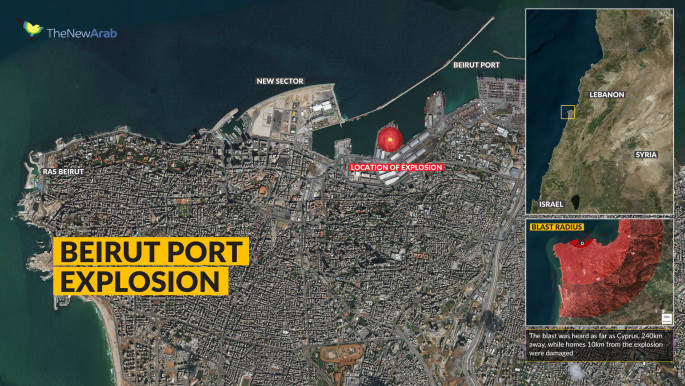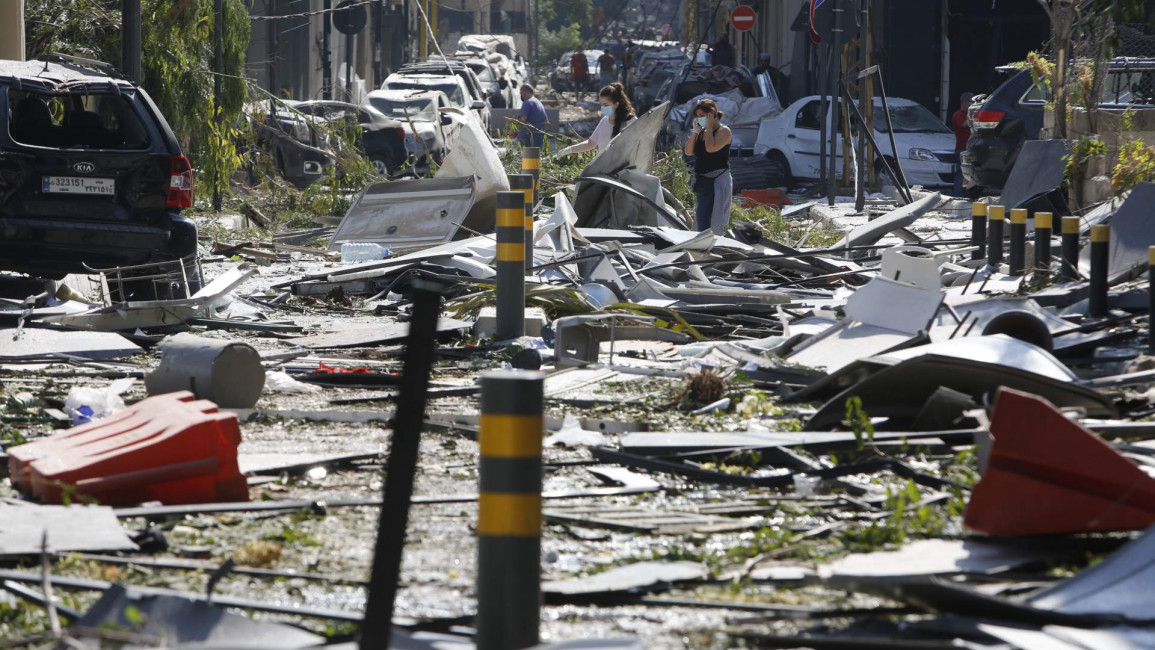Years after civil war's end, half of Beirut damaged in catastrophic blast
The damage extends to more than half of the city, Governor Marwan Abboud said on Wednesday, meaning large parts of the capital are now "unfit" for habitation.
Among the scores of homes and businesses damaged by the terrifying blast wave was The New Arab's Beirut office, where no staff were present at the time of the explosion.
Footage of the office shared by journalist Luna Safwan showed tables and chairs strewn across the floor and in pieces, as a fire alarm rang in the background. The windows of the office were completely blown out. Across the street, another building was shown in a similar condition.
In areas located close to the port, the amount of destruction appears to match that caused by years of civil war between 1975 and 1990.
The reconstruction that followed the civil war is regularly criticised by Lebanese who say it was characterised by a corrupt political elite snatching land for personal profit.
That same entrenched political class is now accused of responsibility for Tuesday's blast for failing to safeguard the stockpile of highly combustible material.
Read more: Lebanese are offering their homes to help 300,000 homeless due to 'apocalyptic' Beirut explosion
Between 200,000 and 300,000 people have been made homeless, the Beirut governor said. That figure is around the same as the total homelessness toll for all of the UK, a country whose population is 10 times the size of Lebanon's.
|
|
"A massacre. I saw people screaming, covered in blood, homes broken, glass shattered, roads that look like Hiroshima or like a tsunami hit," Elie Zakaria, a resident of a neighbourhood close to the port, told AFP.
Many more are thought to be dealing with collapsing ceilings and shattered windows. The blast wave exploded windows as far as 10 kilometres (6 miles) away.Sunk ever further into the depths of an economic crisis that has raised poverty levels to as much as 50 percent of the population, few Lebanese will be able to afford to repair or rebuild their homes.
The Lebanese Red Cross said on Wednesday it would set up temporary shelters with food and hygiene kits to house up to 1,000 families for three days.
Ordinary Lebanese across the nation have taken to social media to offer up their own homes to the needy.
Volunteers - many of them linked to a protest movement that unseated Lebanon's government last year - were cleaning the streets of glass and rubble on Wednesday.
Beirut's port - the main entrance for goods in the country which heavily relies upon imports - has been completely destroyed.
Authorities are still investigating the total extent of the damage but it is estimated to be worth between $3 and $5 billion, Abboud said.
Assessments of the damage will continue with help from the European Union's advanced Copernicus Satellite mapping system, EU Commissioner for Crisis Management Janez Lenarcic said on Wednesday.
 |
| [Click to enlarge] |
Hospitals, already stretched to the brink by the dual economic and coronavirus crises, have also suffered damage.
Saint-Georges hospital has reportedly been forced to turn away patients after suffering severe damage in the exposion and losing several members of staff.
Damage has also been reported at Beirut's Rafic Hariri International Airport. Around 90 percent of the capital's hotels have been damaged, state news agency NNA cited the president of Lebanon's Hotel Federation for Tourism as saying on Wednesday.
The deadly blast appears to have been caused by a fire which ignited 2,750 tonnes of ammonium nitrate stored unsecured for years in a warehouse at the Beirut port.At least 100 people have been confirmed dead, with around 4,000 more injured.
Families have reported hundreds more relatives as missing, among them port workers and dozens of firefighters presumed dead after responding to the initial fire.
Agencies contributed to this report
Follow us on Facebook, Twitter and Instagram to stay connected



